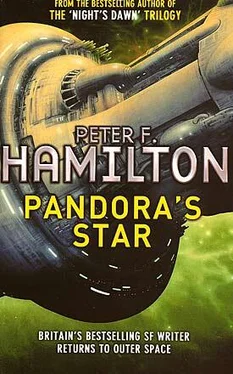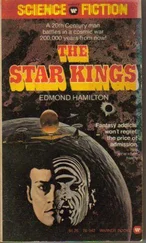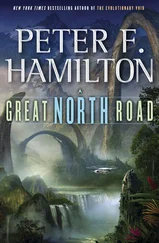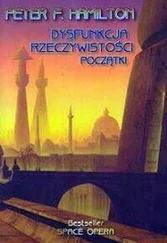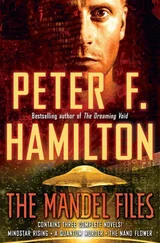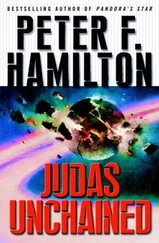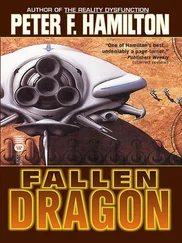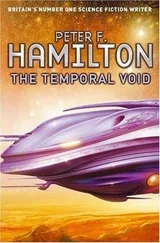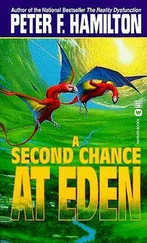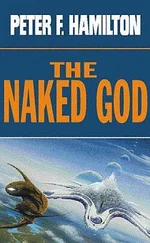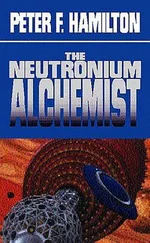Peter Hamilton - Pandora's Star
Здесь есть возможность читать онлайн «Peter Hamilton - Pandora's Star» весь текст электронной книги совершенно бесплатно (целиком полную версию без сокращений). В некоторых случаях можно слушать аудио, скачать через торрент в формате fb2 и присутствует краткое содержание. Жанр: Фантастика и фэнтези, на английском языке. Описание произведения, (предисловие) а так же отзывы посетителей доступны на портале библиотеки ЛибКат.
- Название:Pandora's Star
- Автор:
- Жанр:
- Год:неизвестен
- ISBN:нет данных
- Рейтинг книги:5 / 5. Голосов: 1
-
Избранное:Добавить в избранное
- Отзывы:
-
Ваша оценка:
- 100
- 1
- 2
- 3
- 4
- 5
Pandora's Star: краткое содержание, описание и аннотация
Предлагаем к чтению аннотацию, описание, краткое содержание или предисловие (зависит от того, что написал сам автор книги «Pandora's Star»). Если вы не нашли необходимую информацию о книге — напишите в комментариях, мы постараемся отыскать её.
Pandora's Star — читать онлайн бесплатно полную книгу (весь текст) целиком
Ниже представлен текст книги, разбитый по страницам. Система сохранения места последней прочитанной страницы, позволяет с удобством читать онлайн бесплатно книгу «Pandora's Star», без необходимости каждый раз заново искать на чём Вы остановились. Поставьте закладку, и сможете в любой момент перейти на страницу, на которой закончили чтение.
Интервал:
Закладка:
“The Verona train is leaving from platform nine,” Dudley’s e-butler told him.
He set off down the concourse toward the platform. Verona was a regular destination, with a train leaving every forty minutes. There were a lot of commuters from there, middle management types from the finance and investment companies who were involved with setting up and running Gralmond’s civil infrastructure.
The Verona train was made up of eight double-decker carriages hooked up to a medium-sized PH54 engine. Dudley shoved his cases into the baggage compartment on the fifth carriage and climbed on board, finding an empty seat by one of the upper deck windows. Then there was nothing to do but try to ignore his growing tension as the timer display in his virtual vision counted down toward departure time. There were seven messages for him in his e-butler’s hold file; half of which were from his students containing both data and audio clusters.
The last five months had been extraordinarily busy for the small university astronomy department; even though there had been no stellar observations made in all that time. Dudley had declared that the state of the telescope and its instruments was no longer acceptable, and that they’d been neglecting the practical side of their profession. Under his supervision, the tracking motors had been dismantled and serviced one by one, then the bearings, followed by the entire sensor suite. With the telescope out of commission, they also had the opportunity to upgrade and integrate the specialist control and image analysis programs. At first the students had welcomed the chance to get their hands dirty and improve the available systems. But that initial enthusiasm had long since faded as Dudley kept finding them new and essential tasks that delayed recommissioning.
Dudley hated deceiving them, but it was a legitimate way of suspending the whole Dyson Pair observation project. He told himself that if he could just secure the evidence, then the impact it would have on their department and its budget would more than justify the small subterfuge. It was only during the last couple of months as he put up with all their complaints that he’d begun to think of the effect a verified envelopment might have on his own career and fortunes. Failure to back up the observation would have ruined him; success, on the other hand, opened up a whole new realm of prospects. He could well progress far beyond anything the Gralmond university could offer. It was a pleasant daydream to lose himself in.
The train started moving, pulling away from the platform and out into the spring sunshine. All Dudley could see through his window was the industrial landscape of the station yard, where hundreds of tracks snaked across the ground, crossing and recrossing like some vast abstract maze. Single wagons and carriages were being moved about by small shunting engines that coughed out thick plumes of diesel exhaust. The only visible horizon seemed to be made from warehouses and loading bays, where a spidery gridwork of gantry cranes and container stackers wove through every section of the big open structures. Flatbed carriages and fat tankers were being readied or unloaded within the mechanical systems that almost engulfed them. Engineering crews and maintenancebots crawled along several tracks, performing repairs.
Traffic began to increase on the tracks around them as they headed for the gateway; long cargo trains alternating with smaller passenger carriers. All of them snaked their way over junctions with sinuous motions, arrowing in toward the final stretch of track. On the other side of the carriage, Dudley could see a near-continual stream of trains emerging from the gateway.
There were only two tracks leading to the gateway: one inbound, one outbound. The Verona train finally slotted onto the outbound stretch, fitting in behind the passenger train for EdenBurg. A freighter bound for StLincoln slotted in behind them. A low warning tone chimed through the carriage. Dudley could just see the edge of the curving gateway roof ahead of them. The light dimmed fractionally as they passed underneath. Then there was just the wide shimmering amber oval of the gateway dead ahead, so reminiscent of an old-fashioned tunnel entrance. The train slid straight into it.
Dudley felt a slight tingle on his skin as the carriage passed through the pressure curtain that prevented the atmospheres of the two worlds from mixing. Even though it spanned a hundred eighteen light-years, the wormhole itself had no internal length. The generator machinery that created it had a considerable bulk, however; most of which was tucked away in the massive concrete support buildings behind the roof. It was only the emission units that were contained in the great oval hoop of the gateway, measuring over thirty meters thick. Given the speed the train was traveling, even that flashed past in a second.
Glorious copper twilight streamed in through the carriage windows. Dudley’s ears popped as the new atmosphere flooded into the carriage through the rooftop vents. He looked out at the massive expanse that was CST’s Verona station. There was no visible end to it, no glimpse of the megacity that he knew lay beyond. One edge of the station was a solid cliff of gateways, sheltering under their curving single-span roofs, each oval framing a slightly different colored patch of haze depending on the spectral class of the star whose world they reached. But for the rest of it, as far as the eye could see, trains and tracks were the sole landscape. Behemoth freighters rolled along, their engines dwarfing the GH7s that had so impressed Dudley; nuclear-powered tractor units pulling two-kilometer chains of wagons. Sleek white passenger expresses flashed past pulling dozens of carriages with multiworld commuters whose routes would take them through twenty or more planets as they rushed from gateway to gateway on a never-ending circuit. Simple little regional trains like the one Dudley was on shuffled between their larger, grander cousins. Verona station had them all.
As Earth was the junction world for all the planets in phase one space of the Intersolar Commonwealth, so Verona was the major junction for this section of phase two space, with gateways leading to thirty-three planets. It was one of the so-called Big15; the industrial planets established out along the rim of phase one space, a hundred or so light-years from Sol. Company-founded, company-funded, and company-run.
Verona station boasted seven passenger terminals; Dudley’s train pulled into number three. Again the scale of the place hit home. This terminal alone was five times the size of Gralmond’s planetary station. Verona’s thicker atmosphere and slightly heavier gravity contributed to his feeling of triviality as he wandered along the packed concourse in search of the Tanyata service. He found it eventually on platform 18b, three single-deck carriages pulled by a diesel-powered Ables RP2 engine. His luggage went on an overhead rack, and he sat on a double seat by himself. The carriage was less than a third full. There were only three trains a day to Tanyata.
When he arrived, he could see why there were so few scheduled services. Tanyata was very definitely a frontier planet; the last to be established in this sector of phase two space. It simply wasn’t commercially practical to build wormholes that reached any farther. Verona would link no more Human-congruous planets; that honor now fell to Saville, which was less than ten light-years from Gralmond. CST was already building its new exploratory base there, preparing to open wormholes to a new generation of star systems: phase three space, the next wave of human expansion.
The CST Tanyata station was just a couple of hurriedly assembled boronsteel platforms under a temporary plastic roof. A crane and a warehouse comprised the entire cargo section, backing on to a vast muddy yard where stacked metal containers and tanks formed long rows on the badly mowed vegetation. Wagons and trucks grumbled along the aisles, loading up with supplies. The settlement itself was a simple sprawl of standardized mobile cabins for the construction crews who were laying down the first stage of the planet’s civil infrastructure. Quite a few prefabs buildings were being integrated, with men and big manipulatorbots slotting together reinforced aluminum modules inside a matrix of carbon beams. The biggest machines were the roadbuilders, tracked mini-factories with big harmonic blades at the front chewing up soil and clay. A chemical reactor processed the material into enzyme-bonded concrete that was squeezed out at the rear to form a flat level surface. The thick clouds of steam and fumes swirling out from around the units made it virtually impossible to see them fully.
Читать дальшеИнтервал:
Закладка:
Похожие книги на «Pandora's Star»
Представляем Вашему вниманию похожие книги на «Pandora's Star» списком для выбора. Мы отобрали схожую по названию и смыслу литературу в надежде предоставить читателям больше вариантов отыскать новые, интересные, ещё непрочитанные произведения.
Обсуждение, отзывы о книге «Pandora's Star» и просто собственные мнения читателей. Оставьте ваши комментарии, напишите, что Вы думаете о произведении, его смысле или главных героях. Укажите что конкретно понравилось, а что нет, и почему Вы так считаете.
